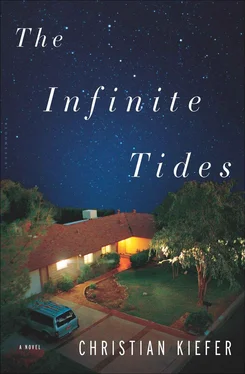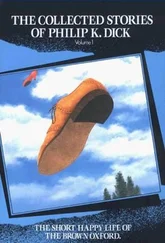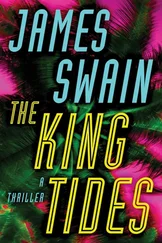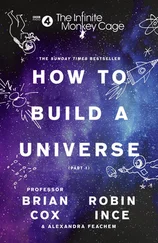When the pain came it was Eriksson who suggested that he was having a migraine and it was Eriksson who helped him to his quarters and into his sleeping bag. He clicked off the blinding bar of light and pulled the curtains closed and there Keith floated, in and out of consciousness, trying to sleep, feeling like he was asleep but also in an agony he could hardly believe. Various members of the crew checked in on him during the first hour and at some point Keith discussed the matter with the flight surgeon on the ground in pained, broken phrases and there was an agreement amongst them that he was experiencing some combination of panic attack and migraine and Eriksson retrieved some additional medication and returned again and took a blood sample and then returned yet again and injected him with something. He was told later that it had been a combination of sedative and painkiller.
He could hear everything: the humming and buzzing of the whole craft where it spun in its seventeen-thousand-miles-per-hour orbit path, two hundred miles above the surface, his vision warped with white and black zigzagging lines that drifted and shook and in the midst of that shaking he pulled himself once again into that otherworld of numbers, trying now to invent mathematical situations that might serve to bring him back from whatever edge he had come to but each time he was dragged right over that edge again, back into the pain. He concentrated, tried to concentrate, his heart’s thudding rhythm in his ears. Where was Eriksson? His eyes clenched like fists and somehow he managed to grasp hold of a single number — the light blue of number one — and then of one again and he placed a plus between them and then an equal sign and the zigzagging lines were everywhere now, even here, and he no longer understood what those symbols meant in his mind or what they were doing there or why he should be thinking about them at all. He could see Quinn then, her face before him in the darkness and her eyes shining out at him, her face as if caught in some eternal eventide, staring back at him as if waiting for him to speak and he opened his eyes. He thought he might have been speaking to her but his voice was a terrible silence that fell out of him into the capsule, was recycled, was breathed in once again.
And now the tiny stars had returned, moving away from him as if in response to the whole of the universe, all points moving away from all other points and these too, these glowing stars in the darkness, reflecting the slit of light filtering in through the curtained opening. Once again he was weeping. He was weeping tiny diamond stars into the recycled atmosphere.
He said her name but then he remembered once again that she was dead and would ever be so and it was not Quinn who was there but Eriksson and he was talking to him: “How are you doing?”
“My head hurts so much,” Keith said.
“Where?”
He tried to look past him. Someone was just outside his quarters. Fisher? Someone else. “Everywhere,” Keith said.
“I need you to be specific,” Eriksson said.
“My head mostly but it radiates out.”
“OK. They’re afraid you have a bleeder in your brain.”
“An aneurism?”
“Could be. Could be something else too.”
“I’m sorry,” Keith said. “I don’t know what’s happening.”
“You’ll be fine. Rest up. Plus, you’re giving our doctors something to do.”
“That’s good.”
“I’m serious. It’s the most excitement I’ve ever seen from those two. They’re in hog heaven. It’s like you with a crazy math problem.”
Keith said nothing in response and the two of them fell into silence.
“You’ll have to call CAPCOM,” Keith said.
“I already did.”
“About the schedule. You’re going to have to clear my schedule.”
“Don’t worry about that. It’s done.”
“Goddammit,” Keith said.
“I’m sorry, buddy.”
“So am I.”
Eriksson said nothing more for a long while. Then: “I’m going to take all your stats again. And I’ll need to do another blood draw.”
“OK,” he said. But he did not move and after another moment of silence Eriksson unzipped the bag and freed his arm and he did not look, could not even feel the needle and a moment later Eriksson had finished, Keith’s blood floating somewhere in a vial in the microgravity and he was zipped back into the bag and his blood was off to the experiment racks in the Destiny Module.
That had been the first but it was not the last. When the pain finally departed, he slept for ten hours and then woke and tried to resume some truncated version of his schedule but after three hours he could hear the sine wave again and Eriksson told him to go back to his quarters. The experience was much the same as the previous evening, this time with the anticipation of what was coming like being drawn slowly into a saw blade, unable to move, unable to even avert his eyes, but watching the blade come closer and closer until it tore into his flesh at last. And like the previous night — and this would be one of the aspects of his experience that would be consistent — he vomited and that seemed to indicate the end of the episode, his body relaxing and the pain subsiding again and he drifted into exhausted sleep at last. Each time Quinn came through the zigzagging darkness like the ghost she already was. He reached for her face, for the crushed remains of her broken body, but his fingers passed through that image as if moving through a cloud of steam. A vapor. Where are you now? Where have you gone now? And no answer from that darkness. He had missed the funeral, missed even listening to the audio feed. It had been recorded and they could play it for him later but what kind of answer could that possibly be?
So it had been and so it would continue: migraine after migraine, sometimes with four or five days or even a full week between them. He knew Houston was trying to get him back to Earth but it was not to be. There were problems with weather and with logistics and technical problems and then problems with the mission itself so he did not take one of the emergency Soyuz capsules down — would not have taken one by himself anyway — and ground control attempted to get a shuttle up earlier and then later a relief crew on another Soyuz capsule but both were delayed and delayed until just a week before he and his crew members would have returned to Earth anyway.
Then another episode during the six weeks of physical therapy at JSC and then nothing, a kind of respite from the pain long enough that he had begun to think the condition had disappeared altogether. But now here it was again and the tears that streamed from his eyes were not the diamonds of his orbit but rather the slick heavy liquid of gravity. How many episodes did that make? He had lost count, or rather had never actually counted, and although it was true that his mind worked in numbers, there were some things that were uncountable, or that equated, in the end, only to a single symbol which was prime and central and represented the start and end of everything that was or could ever be: inescapable and impossible to manipulate and glowing with a radiance that only served to underscore its position, the aleph-null of his consciousness indeed eclipsed by the ever-unfolding infinities to follow.
There had been a life he had led before and a life he would lead after and those two states had been broken along a line stretched between two points on a single plane. What remained was something hollow and ancient and vacant and he realized then that it was simply loneliness and it was everywhere around him and inside of him and there was no one he could call to his side, not on Earth and not in space. He was alone. He would never go into space again. He would never again be an astronaut. His eyes closed to the zigzagged darkness and the blanket over his head, the room itself dark and the early evening shading into night as the whole of Earth spun into its own shadow and Keith Corcoran, former astronaut, lay shivering in that multilayered black night darkness, weeping now, the pain not even reaching its apex yet, that still two hours away at least. Time itself slowing and slowing and slowing in his agony until it seemed as if it had stopped altogether and he was held there as if within a sphere. All things silent for an instant: the empty house, the cul-de-sac, Jennifer and her husband and Nicole as well, even the crickets pausing in their vigil in the vacant lot, Peter and his wife and his children all pausing, perhaps the whole endless interlocking subdivision complex and parking lots and businesses, all traffic lights blinking to red for a single moment and all conversations falling to silence. Can you feel now how memory itself would well up in such a moment? How it would be like a tide that had flowed out long ago and now rushed down into the pools, cupping the rocks and sand and circling the dunes and the waving razor grass? And how we would be alighted upon by a memory, you and I, to fill that silence, to rush into those empty pools? That memory was of her tiny hand curling into his own. Her tiny little girl’s hand on the day of ice cream when Barb’s father was dying or already dead. Ohio glowing everywhere with red and yellow and orange light. How could such a thing be gone and gone forever? How could the universe he had seen give him such a memory only to take her away from him?
Читать дальше












